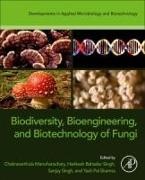Read more
Biodiversity, Bioengineering, and Biotechnology of Fungi examines various fungi genera and their biotechnological applications. The book covers the most common genera of fungi, their structure, their taxonomy, the maintenance and organization of a permanent study collection with associated databases, and their application in diverse sectors including industrial applications in the food, environment, bioenergy, biorefinery, and biopharma sectors.
Compiled by an international team of fungal biologists,
Biodiversity, Bioengineering, and Biotechnology of Fungi provides a wealth of information particularly on the diversity of fungal genera and their biotechnological contributions. The book is a valuable resource for scientists, researchers, health practitioners, nutritionists, industry professionals, advanced students, and all those who wish to broaden their knowledge in the allied field.
List of contents
1. Unravelling the Hidden Diversity and Distribution of Wood-inhabiting Polypores in Subtropical Forests of Southern India
2. Biodiversity, ecological interaction and Bioprospecting potential of Gasteroid fungi
3. Bioluminescent fungi: An overview with implications for the future
4. Realm Of Corticioid Fungi From Kullu District Of Himachal Pradesh - Seven Novel Inclusions
5. Advances in Trichoderma biology for biocontrol applications
6. Wild edible mushrooms (WEMs) and their potential in improving the rural livelihoods in Jammu & Kashmir, and Ladakh
7. Spotlight on the Hidden Treasure of Endophytic Fungal Bioactive Metabolites
8. A systematic Overview of Endophytes in Orchids: Diversity, Application, and Future Prospects
9. Review on Detection of Bioactive Compounds of Ganoderma species In Ghana
10. Genus Fusarium and Fusarium species Complexes
11. Recent developments in state-of-the-art multi-omics techniques for the exploration of microbial diversity
12. Biodiversity and biotechnology of Fungi : Aspects, prospects, and issues
13. Diversity of Litter Fungi associated with some forest localities of Telangana
14. An insight in to the biodiversity and biotechnology of Fusarium species
15. Exploring plant-based resources : A frontier in combating against common foodborne bacterial pathogens
16. Nano-bioengineering of fungi
17. Exploring fungal frontiers: Innovation in secondary metabolite production
18. Biodiversity of fungal pathogens of sugarcane crop and their management
19. The endophytic incidence of Aspergillus Assiutenssis in piper longum and its exploration for piperine production as an alternate source
20. Exploration of Fungal Endophytes isolated from Terminalia arjuna and Terminalia catappa for phytochemicals, antioxidant and bioactive potential against three Fusarium spp.
About the author
Prof. C. Manoharachary?has served Osmania University for 45 long years in different capacities including as Dean. Prof Manoharachary has discovered 20 new fungal genera and 82 new fungal species. He has immensely contributed for the advancement of teaching and research in Mycology and Plant Pathology.. He has been honored with six lifetime achievement awards, served as President of several Indian academies viz., Indian Phytopathological Society, Indian Botanical Society, Mycological Society of India ,Indian Science Congress Association-Botany section. Served as chairman/expert member of UGC,? DST, DBT, MOENF, ICAR, CSIR and others. He did his postdoctoral work in UK, USA, and Germany. Dr. Manoharachary is a fellow of National Academy of Sciences, India, Fellow of National Academy of Agricultural Sciences and Several other academic societies.Prof. H. B. Singh works as Distinguished Professor, Department of Biotechnology, GLA University, Mathura from August 1, 2020 to date. He is a Visiting Professor at Cornell University and University of Illinois, USA, Sau Paulo State University, Sorocaba, Brazil. He is honoured with 22 National and International prestigious awards including the CSIR Award for S&;T Innovation and Fellow of National Academy of Agricultural Sciences Successfully completed 21 research projects funded by various funding agencies. Established fruitful research collaborations with academic and industry researchers and published jointly with national and international collaborators in high impact journals and obtained 19 patentsDr. Sanjay K. Singh, is presently working as In-charge and Senior Scientist, Biodiversity and Palaeobiology group (Fungi), MACS’ Agharkar Research Institute, Pune (Autonomous Institute under DST, Govt. of India). He did his Ph.D. in Botany (Mycology) in1996 from Gorakhpur Univ. He is a fellow of Indian Phytopathological Society, and Society of Applied Biotechnology (SAB), India. He visited Montana State University, USA where he worked with renowned, Prof. Gary Strobel and received specialized training on biology of fungal endophytes and applications of their bioactive metabolites. With vast experience in the field of biodiversity, systematics, taxonomy, multigene sequencing and phylogeny, conservation and biotechnological applications of fungi, Dr. Singh has made note-worthy contributions. Published > 100 research and review articles in journals of repute and 14 book chapters. Besides he has been a reviewers and editorial board members of several prestigious journals.Prof. Sharma is currently working as Professor &Former Head, Coordinator, UGC-SAP (DRS II) Department of Botany, University of Jammu, Jammu , India. He has 25 years of teaching and research experience. His major research interest is in the area of Mycology & Plant Pathology, Mushroom Diversity, Ethnomycology and Ethnobotany. Prof Sharma is life member, Indian Society of Mycology and Plant Pathology, Udaipur, Mycological Society of India and Indian Botanical Society. Prof Sharma has published >126 research papers and edited 2 books

